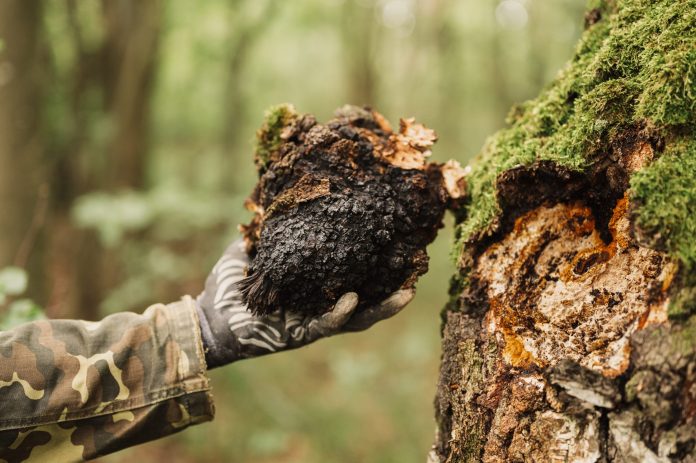The health and wellness industry in the UK has seen a series of health trends come and go. However, one recent trend has both intrigued and impressed: the Chaga mushroom. Originating from the birch trees of Siberia, this fungi is not new to the world of traditional medicine but is swiftly gaining popularity on British shores.
Chaga Mushroom Benefits
Chaga, scientifically named Inonotus obliquus, has been hailed for a myriad of potential health benefits. Some of its most notable benefits include:
- Immune System Support: Chaga is believed to boost the immune system, aiding in the fight against infections and illnesses. Research has suggested that its beta-glucans can modulate the immune system, enhancing its defence mechanisms.
- Antioxidant Properties: Chaga is dense with antioxidants which help counteract the damage caused by free radicals. This can aid in preventing chronic diseases and premature ageing.
- Lowering Cholesterol: Components in Chaga mushroom have been linked to the reduction of LDL or “bad” cholesterol, potentially supporting heart health.
Chaga Mushroom Side Effects
While Chaga has been consumed for centuries, it’s essential to be aware of potential side effects. These can include:
- Interactions with antidiabetic and anticoagulant medications.
- Allergic reactions in individuals sensitive to mushrooms or moulds.
To ensure safety, it’s advisable to consult with a healthcare professional before adding Chaga to one’s diet.
Chaga Mushroom Benefits for Skin
The mushroom’s rich antioxidant content makes it a potential candidate for skincare. Some believe that Chaga can:
- Combat skin ageing due to its anti-ageing properties.
- Reduce inflammation and resultant skin conditions.
Moreover, studies have highlighted the mushroom’s potential in skin protection, especially from harmful UV rays.
Chaga Mushroom for Cancer
Traditional medicine has long employed Chaga in the fight against cancer. Recent research suggests that the mushroom may inhibit cancer cell growth. However, more in-depth studies are required to understand its full potential in cancer treatment or prevention.
Chaga Mushroom Identification
Foraging for Chaga requires a keen eye. Chaga is typically found on birch trees and appears as a charred, blackened mass, contrasting with the smooth bark of the tree. While the exterior is hard, the inside has a softer, cork-like texture. Before foraging, familiarise yourself with its appearance and consult local guidelines.
How to Grow Chaga Mushroom
Interestingly, Chaga does not grow like conventional mushrooms. Instead of cultivating it in a garden or on logs, it thrives in cold climates on birch trees. The process can span years, which makes it a challenge for individual cultivation. However, many suppliers source Chaga sustainably, ensuring its availability in the market.
Chaga Mushroom for Psoriasis
Psoriasis, a skin condition characterised by inflammation and scaly patches, can potentially benefit from Chaga. Its anti-inflammatory properties may alleviate some of the symptoms. Though more research is warranted, anecdotal evidence points towards its efficacy.
Chaga Mushroom for ADHD
The use of Chaga in managing ADHD symptoms is still a relatively unexplored area. Some believe that its calming and neuroprotective properties could aid in reducing ADHD symptoms. However, concrete studies are yet to validate this potential benefit.
Conclusion
Chaga mushroom’s rise in the UK underscores the global movement towards natural and holistic health solutions. With its myriad of benefits and some cautionary notes, it’s poised to remain a significant player in the UK’s health and wellness industry.
FAQ
- Where can I purchase Chaga in the UK?
- Many health stores and online retailers offer Chaga in various forms, from tea to supplements.
- Is Chaga safe for daily consumption?
- In moderation and barring any allergies, Chaga is generally considered safe. However, always consult a health professional for tailored advice.
- How does Chaga taste?
- Chaga tea has a mild, earthy flavour, making it a versatile addition to beverages and dishes.
Note: Always ensure that you source Chaga and any other supplements from reputable suppliers. The efficacy and safety of such products often hinge on their quality and authenticity.
Khalid Irfan is a Fitness expert who enjoys spending time in gym. He also enjoys being in the outdoors and exploring new opportunities whenever they arise as well as researching new topics to expand his horizons.

